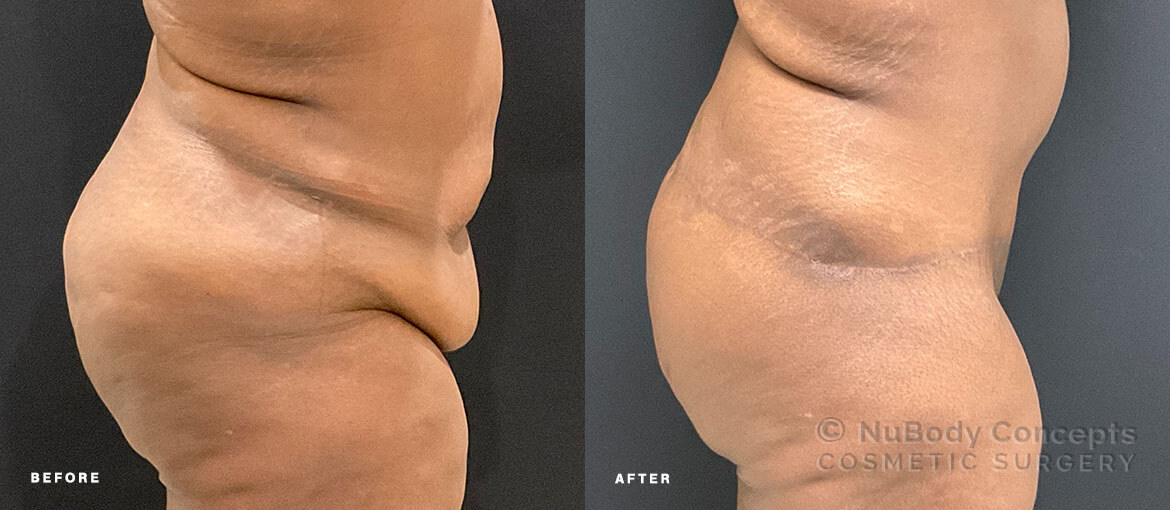
Medically reviewed by Dr. John Rosdeutscher – Written by Sine Thieme
If you are physically healthy and at a stable weight, don’t smoke, and have realistic expectations about your appearance, you are generally a good candidate for a tummy tuck. However, there are additional factors a plastic surgeon will evaluate before taking you on as a patient. Below we discuss each of these factors to help you determine if you qualify for a tummy tuck to remove belly fat.
Reasons for a Tummy Tuck
There may be many reasons as to why you are considering tummy tuck surgery: excess fat, excess skin, or maybe weakened connective tissues in your abdomen (i.e. diastasis recti). Some of the most common reasons for tummy tuck cosmetic surgery include:
- Substantial weight loss or gain
- Pregnancy and childbirth
- Abdominal surgery, such as a C-section
- Age
In some cases, if you have previously had a C-section, your plastic surgeon may be able to incorporate your prior surgical scar into your abdominoplasty incision site.
Are You a Tummy Tuck Candidate?
Often, the following statements describe some of the best patients for abdominoplasty:
- You have successfully lost weight with diet and exercise, yet your abdomen still protrudes, is untoned.
- Your abdominal wall, muscles, and skin are stretched or sagging postpartum
- After significant weight loss, you have loose, drooping skin around your belly.
- Your belly has always stuck out even though you are in very good shape
A tummy tuck / abdominoplasty can address any of these issues and help your body reach your desired shape and achieve a firmer, flatter abdomen.
Below are some questions that help you determine if you are a good candidate for abdominoplasty.
Is Your BMI Under 35?
If you are substantially above your target weight, you will have to lose weight before a tummy tuck is advised. Ideal candidates for tummy tucks have already successfully lost weight, but are left with excess fat and sagging skin in their abdominal region. The skin is loose and droops, and/or the belly protrudes rather than being flat.
So what is a good target weight for a tummy tuck? Start with your Body Mass Index (BMI). It is a simple calculation using your weight and height. Patients with higher BMIs have a higher risk of complications from surgery. According to studies, patients with a BMI over 40 are more than 3 times more likely to face surgical complications than patients with BMIs below 40.
We invite you to calculate your BMI and use the following chart to determine whether you qualify for a tummy tuck:
| BMI < 30 | BMI 30-35 | BMI > 35 |
|---|---|---|
| Ideal candidate for a tummy tuck; but may achieve similar results with a less-invasive option like skin tightening. | Good candidate for a tummy tuck. | Not an ideal candidate; advised to reduce BMI by enrolling in a weight loss program such as the Orbera weight-loss balloon. |
Can Men and Women Have Tummy Tucks?
Tummy tucks are not only designed for women, even though more women have them. Both men and women are equally well suited for tummy tucks. In fact, men tend to benefit more from tummy tucks than women because of the unique type of belly fat they often struggle with.
Belly fat can be of two types: subcutaneous or extra-abdominal fat is the kind of fat that responds very well to liposuction. Visceral or intra-abdominal fat is located behind the abdominal wall and muscles and cannot be removed with liposuction. When men have a “beer belly,” it is often a sign of too much visceral fat. Women can develop it too, but it is more common in men.
Women with good skin elasticity and some – but not too much – subcutaneous fat may not need such an invasive procedure as a tummy tuck. For men with visceral fat, the only option to attain a flatter stomach is a tummy tuck.
Are You Planning on Having More Children?
Having a tummy tuck does not prohibit a future pregnancy or pregnancies in any way, shape, or form. The growth and well-being of your baby will not be affected by a previous tummy tuck. If you are unhappy with the shape of your belly and are otherwise a good candidate for a tummy tuck, there is no medical reason to delay your surgery.
However, there are non-medical benefits to delaying a tummy tuck until you are done having children. It’s not really possible to “baby proof” a tummy tuck. No plastic surgeon can guarantee that a tummy tuck will “survive” a pregnancy unblemished. Your skin might stretch beyond the point of no return, or your abdominal muscle might split. If you’ve already had this happen during a previous pregnancy, there is a good chance it will happen again.
If you are not sure whether you will have more children and are unhappy with the present shape of your abdomen, you may not want to delay your tummy tuck. But if you want to make sure your money is well spent without the need for future revisions, you may want to wait with your tummy tuck until after your last child is born.
Are You Medically Cleared for Surgery?
Even if you meet all the other conditions, the state of your general health can make you a poor tummy tuck candidate. This is something your doctor will go over during a consultation. The following underlying conditions are typical warning flags for plastic surgeons:
- asthma
- diabetes
- high blood pressure
- chronic heart conditions (especially those requiring blood thinning medications)
- smoking or other tobacco use
If you are on any kind of heart medication or blood thinner, you will need to disclose it to the plastic surgeon. Blood thinners can have serious effects on the ability to heal after surgery. Such patients will need to supply a letter from their cardiologist allowing the patient to be off blood thinners for a certain number of days before and after the surgery.
Smoking (or having smoked in the past) puts patients at greater risk of infection and significant surgical complications like delayed healing, additional scarring, or skin death. It can also create problems with the recovery from anesthesia such as coughing or increased bleeding.
Tummy Tuck After C-Section, Gastric Bypass, or Gastric Sleeve
Tummy tucks are great procedures for anyone who has lost a large amount of weight. Substantial weight gain typically stretches the abdominal skin beyond the point where it can easily shrink back. This means that when you lose all that weight again, you’ll be left with extra skin that you cannot get rid of.
If you have lost weight on your own with diet and exercise, you can have a tummy tuck as soon as you have reached your target weight. However, if you have achieved your target weight with a surgical intervention such as gastric bypass surgery or a gastric sleeve, maintaining a stable weight for a certain amount of time post-surgery is recommended. This period can range from 6 months to 2 years. If you had bariatric or laparoscopic surgery, ask your doctor how long you should wait before scheduling a tummy tuck.
There are less-invasive options for weight loss, such as the Orbera Gastric Balloon. Weight-loss balloons are placed and removed in a non-surgical procedure. This means that for such patients no waiting period is required before they can undergo a tummy tuck.
It is perfectly safe to have a tummy tuck after a previous C-section. However, as with bypass surgery, it is recommended that you wait at least 6-12 months after a cesarian delivery. If you breast-feed your baby, you should wait 6 months after weaning the baby before having a tummy tuck.

Candidates for Non-Surgical Tummy Tucks
Candidates who only struggle with the extra fat but have great skin elasticity may be able to attain a flatter abdomen with liposuction alone, without the need for more invasive surgery. This is typically true for younger patients, or women who have not gone through pregnancy and childbirth. Liposuction is minimally-invasive and has many advantages over the more invasive tummy tuck. It does not leave a long scar, and it is much easier to recover from.
Even candidates with moderate skin laxity may be able to attain a firmer, flatter abdomen without needing a tummy tuck. Modern technologies such as skin tightening with BodyTite and Renuvion have given plastic surgeons better non-surgical options for shrinking tissues and tightening skin. Such procedures utilize heat generated by targeted radio frequency energy delivered via a probe inserted under the skin through tiny incisions.
At NuBody Concepts, we want to make sure our patients are well-informed about their body contouring options. If you don’t truly need a tummy tuck to achieve your goals, we will make sure you learn about your other options.
We hope that we’ve given you a better understanding about tummy tuck candidates. Please don’t hesitate to contact us if you have any other questions.
If you are ready to get started, use the pink button to schedule a consultation with our board-certified plastic surgeon in Nashville or Memphis.















